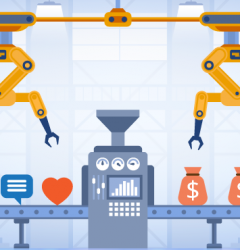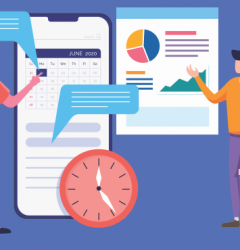10 Aug

Are you looking for ways to succeed in the digital world but intimidated by complex coding languages and technical jargon? Fear not, because the future of digital success lies in the power of no-code tools. With no-code skills, you can unlock a world of limitless potential, revolutionize the development process, and thrive in the digital landscape.
Technology is advancing at an unprecedented rate, and businesses must keep up with the pace to remain relevant. With the growing need for automation and digitalization, the demand for software developers and IT professionals is on the rise. However, not everyone has the technical expertise or time to learn programming languages. This is where no-code skilled citizen developers come in. No-code is a visual development environment that allows users to create applications without the need for traditional coding.
In this blog, we will explore why no-coding skills are required for success in the digital world and how you can develop them to unlock your digital potential. Get ready to embrace the power of no-code and take your digital success to the next level!
What are No-Code Skills?
No-code refers to the practice of using software to automate tasks without requiring programming skills. It is a visual development approach that enables users to create applications by simply drag and drop programming pre-built components. The no-code approach eliminates the need for coding, making it easier and faster to build applications. No-code platforms have become increasingly popular, and they allow anyone to create websites, mobile apps, and business tools without any coding knowledge.
Also Read: No-Code Citizen Development tools can fill a void caused by the Great Resignation
The Growing Importance of No-Code Skills
As businesses shift towards digitalization, the demand for professionals with no-code skills is rising. These skills allow individuals to develop and manage digital solutions without programming knowledge.

1. Accessible to anyone
One of the most significant advantages of no-code is that it is accessible to anyone, regardless of their technical expertise. Traditional coding requires years of learning and practice, making it difficult for non-technical users to get involved. With no-code, anyone can create applications with minimal training, making it a more inclusive and accessible approach.
2. Saves time and money
Building applications from scratch can be a time-consuming and costly process. No-code platforms provide pre-built components that can be easily combined to create an application. This approach saves time and money, making it an attractive option for businesses that want to create applications quickly and efficiently.
3. Promotes innovation
No-code empowers users to experiment and create applications without the need for traditional coding. This approach promotes innovation and creativity, enabling users to create applications that are tailored to their specific needs. No-code platforms allow businesses to experiment with new ideas & concepts, driving innovation in the digital world, and we all know Organization That Failed to Innovate- FAILED.
Also Read: No-Code for Entrepreneurs: A 12-Step Roadmap to High-Income Skills
No-Code Skills and the Digital Landscape
No-code skills have emerged as a key asset in this dynamic environment, enabling companies to quickly and easily build and deploy software solutions without coding expertise.
1. Overview of the digital world
The digital world is an interconnected network of technologies that enable communication, information sharing, and the creation of digital content. It encompasses a broad range of devices, platforms, and software, including computers, smartphones, social media, e-commerce sites, and online services. The digital world has transformed how people live, work, and interact, and it continues to evolve rapidly, driven by advances in technology and changing consumer demands.
2. The increasing demand for digital solutions in all industries
The digital transformation of industries has been ongoing for several years now, but the COVID-19 pandemic has accelerated the adoption of digital technologies even further. Companies that were once hesitant to adopt digital solutions have been forced to embrace them to survive. From online shopping to remote work, digital solutions have become essential to business operations.
The demand for digital solutions is not limited to the tech industry. Every industry, from healthcare to finance, is experiencing a shift towards digitalization. Companies that fail to adapt to this change risk falling behind their competitors.
3. The role of No-Code skills in meeting the demands
No-code platforms are becoming increasingly important in meeting the growing demand for digital solutions in all industries. With no-code skills, non-technical users can create digital solutions without the need for traditional coding. No-code platforms provide pre-built components that can be easily combined to create applications, making the development process faster and more efficient.
According to a survey by Gartner, by 2024, no-code application development will account for 65% of all application development activity. This highlights the increasing importance of no-code skills in the digital landscape.
No-code skills also enable businesses to create applications that are tailored to their specific needs. This is particularly important in industries where off-the-shelf solutions are not suitable, such as healthcare and finance. With no-code skills, businesses can create customized solutions that meet their unique requirements.
No-code skills can help businesses save time and money. Traditional coding requires extensive training and can be time-consuming, but with no-code platforms, users can create applications quickly and efficiently. This makes it a cost-effective solution for businesses looking to digitalize their operations.
No-code skills play a crucial role in meeting the increasing demand for digital solutions in all industries. They enable non-technical users to create applications without the need for traditional coding, making the development process faster, more efficient, and cost-effective. With the digital transformation of industries showing no signs of slowing down, non-coding skills are becoming essential for businesses and individuals looking to stay ahead of the curve.
No-Code Skills You Need to Succeed
No-code tools have revolutionized how we build and create products, making it easier for non-technical individuals to create complex applications without writing code. However, to be a successful no-code product owner, there are some top skills you need to master. Here are some of the skillsets that every no-code product owner should have:
1. Communication skills
No-code product owners need to communicate effectively with stakeholders, developers, and users to ensure everyone is on the same page. Good communication skills can help you articulate your vision and build consensus around your product.
2. Logical thinking
No-code developers need to be able to think logically & break down complex problems into smaller, more manageable pieces. Logical thinking is crucial for designing effective workflows and user-friendly navigation.
3. Adaptability
No-code platforms are constantly evolving, and being adaptable can help you keep updated with the changes and take advantage of new features and tools. Being adaptable helps you stay ahead of the curve and deliver innovative products that engage your users.
4. Systematic approach
No-code product owners need to be able to think about their products as a system rather than a collection of individual components. System thinking helps you identify and solve problems holistically rather than just addressing individual symptoms.
5. Eye for design
No-code tools offer many customization options, but without a good eye for design, your product may look cluttered and confusing. A good no-code developer knows how to create clean and visually appealing designs that are easy to navigate.
6. Data skills
While not strictly necessary, having data skills can be a bonus for no-code product owners. Collecting & analyzing data can help you make more informed decisions about your product and identify areas for improvement.
7. Patience
No-code tools can sometimes be frustrating, and it takes patience to work through the bugs and glitches that inevitably come with any software. A patient no-code product owner is more likely to successfully create high-quality products that meet their users’ needs.
8. Creativity
No-code tools are versatile and offer a lot of customization options. Creativity can help you create unique and effective solutions for your users, and creativity helps you break out of the mold & create something that truly stands out.
9. Project management skills
While product owners are not project managers, having some project management skills can help you plan and execute your projects more effectively. Managing timelines, budgets, and resources is crucial for delivering high-quality products within the timeframe & budget.
10. User empathy
Understanding your users’ needs and pain points is crucial for creating a successful product. Empathizing with your users can help you create products that meet their needs and deliver real value.
Why You Need No-Code Skills to Succeed in the Digital World
The digital world is constantly evolving & businesses must stay ahead of the competition. Having no-code skills can give you a competitive edge and help you succeed in this fast-paced environment.
1. High in demand
As more businesses embrace digital transformation, Many companies are now recognizing the value of non-coding skills in demand. Companies are looking for employees who can create applications quickly and efficiently without the need for traditional coding. Having no-code skills on your resume can be a significant advantage in the job market, making you a more desirable candidate for digital roles.
2. Enable you to automate tasks
No-code skills enable you to automate repetitive tasks, making you more productive and efficient. With no-code skills, you can create applications that automate manual processes, freeing up your time for more important tasks. Automation is becoming increasingly important in the digital world, and no-code skills enable you to stay ahead of the curve.
3. Allow you to be more independent
No-code skills allow you to create applications without the need for traditional coding, making you more independent. With no-code skills, you can create applications on your own, without the need for a developer. This independence gives you more control over the development process, enabling you to create applications that meet your specific needs.
4. Increased efficiency in app development
No-code platforms offer pre-built components that can be easily combined to create applications. This eliminates the need for manual coding, which can be time-consuming and requires extensive training. According to a survey by Forrester, no-code platforms can reduce the time to develop an application by 50-80%.
5. Lower costs
Traditional coding requires extensive training and specialized skills, which can be expensive to acquire. With no-code platforms, non-technical individuals can create applications without the need for specialized training or hiring additional staff. This makes it a cost-effective solution for businesses looking to digitalize their operations.
6. Increased flexibility and customization
No-code platforms offer flexibility and customization options that are not available with off-the-shelf solutions. Businesses can create applications that are tailored to their specific needs, which is particularly important in industries where off-the-shelf solutions are not suitable.
7. Empowerment of non-technical individuals to create their own solutions
No-code platforms empower non-technical individuals to create their own solutions without the need for traditional coding. This enables businesses to leverage the expertise of their employees, regardless of their technical background. This also enables businesses to respond quickly to changing needs and trends.
According to a survey by Gartner, by 2024, no-code low-code application development will account for more than 65% of all application development activity. This highlights the increasing importance of no-code skills in the digital landscape.
No-code skills are becoming increasingly crucial for success in the digital world. No-code is accessible to anyone, saves time and money, and promotes innovation. Having no-code skills on your resume can give you a significant advantage in the job market, while also enabling you to automate tasks and be more independent. With the growing demand for no-code skills, it’s essential to start learning today to stay ahead of the curve and succeed in the digital world.
With the increasing demand for digital solutions in all industries, no-code skills are becoming essential for businesses and individuals looking to stay ahead of the curve.
Also Read: Staying Vigilant is the key to Revolutionizing your Business with No-Code
Case Studies: No-Code Success Stories
There are several successful companies that have utilized no-code tools to develop customized solutions for their business needs. One such example is Quixy, a leading no-code platform that has helped numerous businesses streamline their processes and increase efficiency.
1. Quixy’s success stories
Quixy has helped businesses across various industries, including healthcare, finance, manufacturing, and logistics, to create customized solutions using its no-code platform. Some examples of successful businesses that have used Quixy’s platform include:
Adani Green
Adani Green faced a challenge in tracking more than 1400 purchase requisitions (PR) every month using a combination of manual and semi-automated methods, which resulted in delays and errors. Quixy’s no-code solution enabled Adani Green to create an end-to-end workflow for PR tracking, with more than 80 business rules and field types.
The solution allows users to add information like business types, domains, nature and projects, and the system reflects the different SLA days based on the criticality of the project. The solution also sends reminders at every stage and provides real-time data availability, resulting in higher employee satisfaction and reduced manual work.
Vance and Health
Vance and Health, a fast-growing Pharmaceutical Company in India, faced a critical challenge in their procurement system. They needed to ensure efficient and timely sourcing of critical raw materials while also maintaining quality and compliance. Vance & Health wanted to eliminate the inaccuracies and uncertainties of manual processes and transform their workflows. With Quixy, they were able to build a customized and flexible procurement system that automated processes from the creation of indents to the receipt of materials and quality checks.
The transformation streamlined procurement operations, eliminating the need for manual and email-based processes and enhancing overall efficiency by 30%. Real-time access to procurement data and customizable workflows allowed for necessary changes to be made as needed. The procurement, accounts, and quality teams now have more control and employee satisfaction has improved.
HMWSSB
HMWSSB, responsible for inspecting nearly 10 lakh water and sewerage connections, struggled with manually tracking customer account numbers. With data stored in Excel and manual reports, data validation and real-time tracking were nearly impossible. In just 15 days, HMWSSB built a Quixy-powered inspection module to consolidate data and eliminate tedious manual work.
Inspectors can now track payment details, location, and inspection images in real-time, providing complete transparency. Automated reports are generated and sent to the necessary stakeholders, increasing efficiency and reducing paper waste. Quixy’s no-code capabilities saved HMWSSB time and money while providing a universal view of the data.

2. Overview of strategies and successes
These businesses utilized Quixy’s no-code platform to develop customized solutions that were tailored to their specific needs. By leveraging the platform’s pre-built components, they were able to develop solutions quickly and efficiently without the need for traditional coding.
The no-code solutions developed by these businesses resulted in increased efficiency, reduced costs, and improved customer experiences. By automating manual processes, they were able to free up valuable resources, enabling them to focus on their core business activities.
Quixy’s platform also enabled these businesses to respond quickly to changing needs and trends. They were able to modify their solutions as needed, without the need for extensive re-coding, ensuring that their processes remained optimized and efficient.
These success stories demonstrate the power of no-code tools in enabling businesses to develop customized solutions that are tailored to their specific needs. By leveraging these platforms, businesses can streamline their processes, reduce costs, and improve customer experiences.
Also read: Empowering Business Industries with No-Code Solutions: Top Beneficiaries Revealed!
Developing No-Code Skills
No-code skills are becoming increasingly important, and individuals who possess these skills are in high demand. Fortunately, there are several resources available to help individuals develop these skills.
1. How to develop No-Code skills
- Start with a no-code platform: The best way to learn no-code skills is to start working with a no-code platform. Quixy, the no-code platform with a user-friendly drag-and-drop interface, can revolutionize the way you work. With it, you can design and deploy complex applications without any coding expertise.
- Join online communities: There are several online communities, such as Reddit, Facebook, and LinkedIn, dedicated to no-code development. These communities provide a wealth of information, including tutorials, examples, and best practices.
- Attend webinars and workshops: Several LCNC platforms offer webinars and workshops to help individuals develop their skills. These events provide a structured learning environment and allow individuals to ask questions and interact with experts.
2. Overview of available resources
- Tutorials and Documentation: Most no-code platforms offer detailed tutorials and documentation to help users get started. These resources provide step-by-step instructions and examples to help individuals develop their skills.
- Online Courses: Several online courses, such as Udemy and Coursera, offer no-code development courses that cover a range of topics, from beginner to advanced.
- Blogs and Podcasts: Several blogs and podcasts are dedicated to no-code development and provide regular updates, tips, and tricks.
3. Importance of continuous learning
No-code development is a rapidly evolving field, and it is important to stay up-to-date with the latest trends and technologies. By continuously learning, individuals can develop their skills, stay competitive, and adapt to changing business needs.
Continuous learning can also help individuals identify new opportunities and expand their career prospects. By staying informed about the latest technologies and best practices, individuals can position themselves as experts in the field.
No-code skills are becoming increasingly important in the digital landscape, and there are several resources available to help individuals develop these skills. By starting with a no-code platform, joining online communities, attending webinars and workshops, and utilizing available resources, individuals can develop their skills and stay competitive in the no-code job market. Additionally, continuous learning is critical to staying up-to-date with the latest trends and technologies, expanding career prospects, and adapting to changing business needs.
Challenges and Limitations
While no-code tools offer several advantages, there are also limitations to their use, and challenges faced by those developing no-code solutions.
1. Challenges faced by those developing No-Code solutions
- Limited Technical Expertise: No-code tools are designed for non-technical users, but there may still be a learning curve for those who are not familiar with the platform. Users may need to invest time and effort to develop their skills and create effective solutions.
- Platform Lock-in: No-code tools can be limiting when it comes to switching between platforms or migrating to different solutions. Users may need to invest in training and development for a new platform, which can be time-consuming and expensive.
- Security and Data Privacy: No-code solutions may be vulnerable to security(Shadow IT concerns) and data privacy issues like any other SDLC threats. Users may need to take extra precautions to ensure that their solutions are secure and compliant with data protection regulations.
2. Strategies for overcoming these challenges
- Plan and Scope: To overcome the limitations of no-code tools, it is essential to plan and scope the project carefully. Users should identify the features and functionality required and evaluate the capabilities of the platform before starting the project.
- Research and Evaluate: Users should research and evaluate different no-code platforms before selecting one. They should consider the platform’s features, integrations, performance, and scalability to ensure that it meets their requirements.
- Training and Development: To overcome the challenges of limited technical expertise, users should invest in training and development. They can take advantage of the tutorials, webinars, and online courses offered by the platform or join online communities to learn from others.
- Security and Compliance: Users should take extra precautions to ensure that their no-code solutions are secure and compliant with data protection regulations. They should follow best practices for security and privacy and regularly monitor and update their solutions.
While no-code tools offer several advantages, there are also limitations and challenges to their use. By planning and scoping the project carefully, researching and evaluating different platforms, investing in training and development, and taking extra precautions for security and compliance, users can overcome these challenges and create effective no-code solutions.
Conclusion
No-code skills are the future of digital success, offering increased efficiency, lower costs, and limitless customization. These tools empower non-technical individuals to innovate and create without technical roadblocks.
Continuous learning and utilizing available resources are key to developing no-code skills. Though challenges exist, careful planning, research, and investment in training can overcome them.
To stay competitive in the ever-growing digital landscape, businesses and individuals must embrace no-code tools. With advancements in AI, automation, and cloud computing, the potential for no-code development is limitless.
No-code development is set to revolutionize the industry, and those who stay ahead of the curve will thrive. Embrace the power of no-code and unlock your digital potential.
Begin your journey towards streamlined operations and tailored apps – all with the simplicity of our platform. Get started today to harness the potential of automation.
Frequently Asked Questions (FAQs)
Q. What are no-code skills, and why are they essential in the digital world?
No-code skills refer to building software applications or automating business processes without writing any code. In the digital world, where the demand for digital transformation is high, no-code skills are becoming increasingly important. They empower business professionals to develop their own custom applications and automate repetitive tasks without relying on traditional software development skills. This enables businesses to be more agile, responsive, and innovative, allowing non-technical stakeholders to be more involved in the development process.
Q. What are some examples of popular no-code tools?
There are several popular no-code tools and platforms available today, including Quixy. It provides intuitive interfaces that allow users to drag and drop pre-built components to create custom workflows, databases, and web applications. It enables business professionals to develop custom software solutions and automate processes without relying on traditional software development skills.
Q. What are the resources to help one no-code?
There are several ways to learn no-code skills, including online courses, tutorials, and hands-on practice. Platforms like Udemy, Coursera, and Codecademy offer online courses on various no-code tools and platforms. YouTube is also an excellent resource for finding free tutorials and walkthroughs. In addition, some no-code platforms like Quixy offer in-house training for no-code resources and communities. To get started, it’s recommended to pick a tool or platform that aligns with your interests and needs and begin with some simple projects to gain confidence and familiarity.
Q. Will learning no-code skills replace coding jobs?
No, learning no-code skills does not replace coding jobs. No-code skills are complementary to traditional coding skills rather than a replacement. No-code skills can be valuable to a developer’s skillset, allowing them to work more closely with non-technical stakeholders and contribute to digital transformation efforts. No-code skills can also be a standalone skillset for business professionals, who can use them to develop custom applications and automate processes without relying on traditional developers.
Q. What is the meaning of no-code?
No-code is the ability to build applications, workflows, and automations without the need for traditional coding or programming knowledge. Instead, no-code tools and platforms provide a visual interface and pre-built blocks of code, allowing users to create and customize digital solutions using drag-and-drop functionality and other user-friendly features. No code skills are becoming increasingly important in business and technology as they enable non-technical stakeholders to contribute to digital transformation efforts and streamline workflows.
Q. What is a no-code job?
A no-code job is a role or position requiring skills in no-code tools and platforms. Some examples of no-code jobs include automation specialists, business analysts, UX designers, and product managers. No-code skills are becoming increasingly valuable in the tech industry. They allow individuals to bridge the gap between technical and non-technical stakeholders and contribute to digital transformation efforts.
Q. How to learn no-code?
Learning no-code development is an exciting journey that can open up a world of possibilities for creating software solutions without traditional coding. Here are some steps to get started on your path to learning no-code:
1. Research and understand the concept.
2. Identify your goals and interests.
3. Choose a no-code platform.
4. Learn from tutorials and documentation.
5. Join online communities and forums.
6. Take online courses.
7. Practice and build projects.
8. Collaborate and network.
9. Stay updated and continue learning.
Remember, learning no-code development and becoming a citizen developer requires patience, persistence, and a hands-on approach. Embrace the learning process, be curious, and don’t hesitate to experiment. With dedication and practice, you’ll soon be proficient in building innovative solutions using no-code tools. For better insights, you can read our in-depth guide on how to become a citizen developer.
Q. Can I create an app without coding?
Yes, you can create an app without coding skills using no-code skills. No-code tools provide intuitive interfaces and drag-and-drop functionalities that allow you to build applications visually. By leveraging these tools, you can design, customize, and deploy your app without writing a single line of code. No-code skills empower non-technical individuals to bring their ideas to life, opening up opportunities for innovation and app development without the need for traditional programming skills.
Q. How can no-code skills benefit individuals?
No-code skills empower individuals to turn their ideas into reality without depending on technical expertise. It opens up opportunities for entrepreneurship, personal projects, and career growth in fields such as product management, marketing, and operations.
Subscribe
Login
Please login to comment
0 Comments














